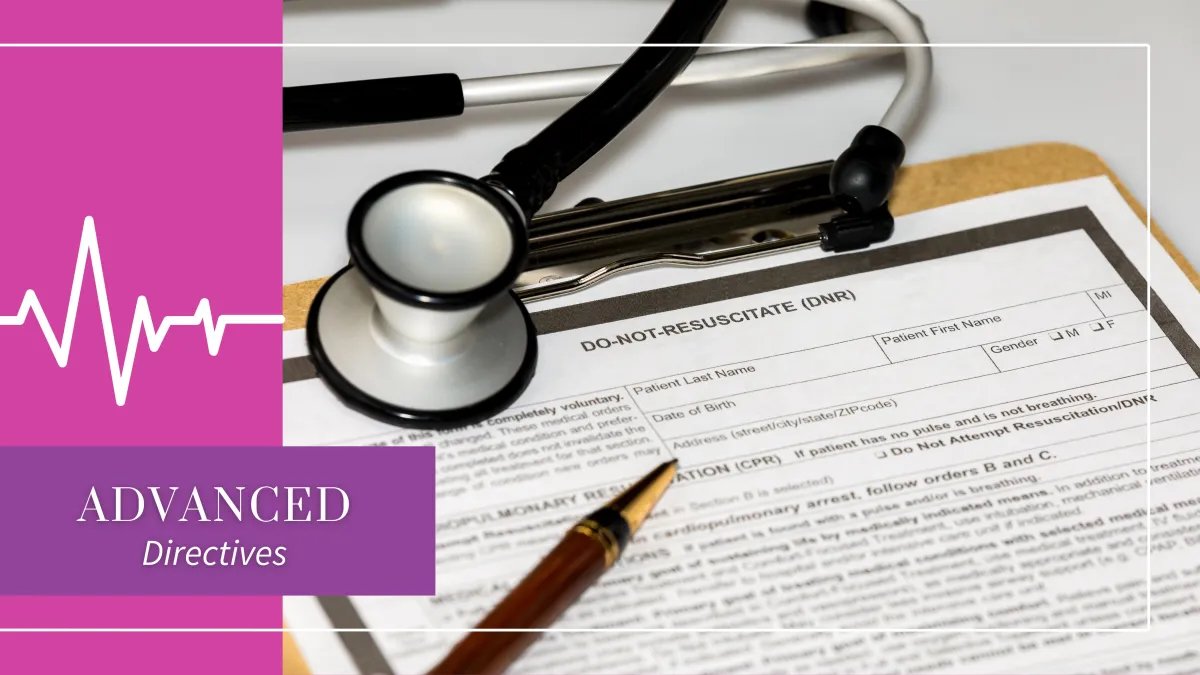Advanced Directives
August 13, 2024
Here’s a topic pretty much no one wants to talk about – advanced directives – because it means thinking about death, and more specifically, our own death. Advanced directives are a variety of written, legal documents that specify and clarify your health and end of life wishes if you are unable to make decisions for yourself. Considering our mortality is never an easy thing to contemplate. It’s uncomfortable, unnerving, and eerie.
But it is necessary to have these conversations and prepare advanced directives because it is beneficial for you and your loved ones. There are multiple documents that fall under the category of “advanced directives,” which include living wills, power of attorney, and DNRs. The internet does provide clear and helpful information on each of these documents, what they entail, and why they are important. Here are two places to start:
Why You Need an Advance Directive (msn.com)
Living wills and advance directives for medical decisions – Mayo Clinic
Rather than get super technical about each of these documents, which the internet, and even more so – a lawyer, can do much better, I want to share two personal experiences that show the importance of having advanced directives in place – one involves a power of attorney (POA) and one involves a do not resuscitate (DNR).
A healthcare power of attorney is a legal document naming a specific person to make health decisions on your behalf if you are unable. After my grandma died from ALSP, my grandpa quickly got remarried. Without getting into messy details, it was a hard transition for my family to make, and my family and my grandpa’s new wife never really meshed. We were cordial, but tough conversations – on a variety of topics – were never had. One of those topics that was never discussed was who would be my grandpa’s POA. My aunts assumed it would be my grandpa’s wife. My grandpa’s wife assumed it would be one of my aunts. Coupled with that, my grandpa’s last wishes had not really been discussed and made widely known. For example, did he want to stay at home or go to a nursing home when he could no longer care for himself? My grandpa developed dementia, and the need to enact a POA for him was upon us. Already tense relations made navigating my grandpa’s healthcare really difficult. Everyone was hesitant to accept responsibility and make the hard decisions, and we did not have legal documents to fall back on to guide us. There was a lot of floundering, confusion, differing opinions, hurt feelings, and anger. Care that my grandpa needed was delayed because no one knew who should make the final decision or even what those final decisions should be. End of life is always stressful and emotionally charged; there’s no getting around that. However, had a POA been put in place, I do believe it would have alleviated at least some of the stress and dissension my family experienced.
A DNR is a legal document stating the person’s wish that in certain circumstances, they do not want to be resuscitated by CPR if they stop breathing and their heart stops beating. Having lost other family members to ALSP, my mother was very clear about her end of life wishes, and she took the steps to get those wishes documented. I will always be thankful those instructions were in place. My mom suffered from very long, very hard seizures. During her last seizure she stopped breathing; she was turning blue. In that frantic, traumatic moment, emergency personnel were barking out clipped questions, asking my dad what they should do. Because my mom’s wishes were clearly defined, my dad could give quick, direct answers, knowing he was abiding my mom’s wishes. No one ever wants to be in a situation that requires such decisions. It’s emotional. It’s panic inducing. But I can tell you that knowing my mom’s wishes before being thrust into such a situation helped. Dad knew what decisions to make, and he did not have to grapple with guilt, wondering if he made the “right” decision in that heated moment.
I’ll end where I started; no one likes having these conversations and laying out their end of life wishes. But there are countless examples of the benefits of having advanced directives completed. Thankfully, there are many, many resources that can help you as you think through these complicated questions. Sisters’ Hope Foundation provides a few in our Resource Center, and Elder Law Lawyers are especially knowledgeable about these documents. I encourage you to start these conversations and work to prepare these documents. They will provide peace of mind to you and your loved ones.

